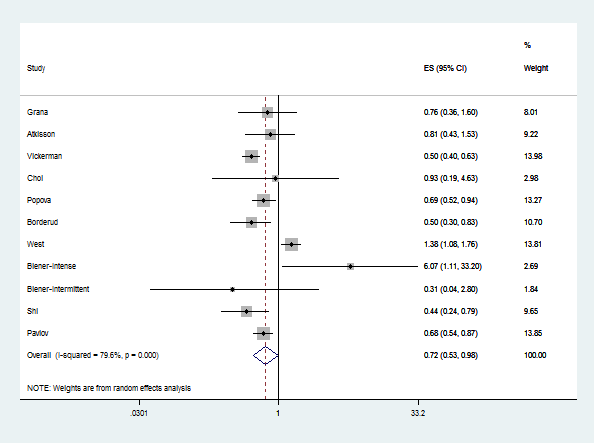Two more studies -- one from US and one from UK -- show e-cigarette users are less likely to quit smoking
Two well-done new studies, one from the USA by Wael Al-Delaimy and colleagues at UC San Diego and another from Sara Hitchman and colleagues at Kings College London, have reported that smokers who use e-cigarettes are less likely to quit smoking cigarettes.
Both are longitudinal studies (i.e., studies that followed the same people forward in time) that compared quitting cigarettes among smokers who did and did not use e-cigarettes at the beginning of the study. Both also accounted for level of addiction as well as other demographic factors.
The drop was statistically significant in the Al-Delaimy study (OR=0.42, 95% CI 0.18 to 0.93) but not the Hitchman study (OR=0.83; CI 0.52 to 1.30). Hitchman did find significant reductions in quitting among non-daily users of “cigalike” e-cigarettes – the most common use pattern (55% of e-cigarette users at follow-up in the UK) and the kind of e-cigarettes that the big cigarette companies are promoting) -- with an OR of 0.35 (CI 0.20 to 0.60). Hitchman also found drops (albeit not significant) in quitting for daily cigalikes (OR 0.74) and nondaily tank systems (OR 0.70). These three groups comprise 88% of e-cigarette users in the UK.
In contrast, Hitchman found that daily users of tank systems (12% of e-cigarette users) were significantly more likely to have quit smoking (OR 2.69, CI 1.48 to 4.89).

In terms of cigarette consumption, Al-Delaimy found that e-cigarette users were significantly less likely to reduce the number of cigarettes smoked. Leonie Brose and colleagues, using the same dataset as Hitchman found a reduction in cigarettes smoked among daily (26% of e-cigarette users at baseline), but not non-daily, e-cigarette users.
This brings the number of population-based studies to 13, 11 of which found reductions in quitting among e-cigarette users. Putting them together in a meta-analysis (figure) yields a statistically significant pooled OR of 0.707 (CI 0.538 to 0.928), meaning that, taken together, all the available population studies, taken together, indicate that e-cigarettes depress quitting smoking by about 30%.
Both groups found that people who were trying to quit smoking were more likely to be using e-cigarettes. In other words, the e-cigarette companies have convinced smokers to try quitting with e-cigarettes, but for the great bulk of them, the e-cigarettes keep people smoking cigarettes.

Again you use a study following treatment failiures
This is a study following dual-users. Dual users are treatment failiure so they are a biased sample.
Dual use is the dominant use pattern, not a "treatment failure"
If e-cigarettes were available by prescription and used as part of a supervised smoking cessation program, your comment would be appropriate.
But that is not how e-cigarettes are being marketed. They are being mass marketed as a recreational consumer product, including as a way to get around smokefree rules. What these papers -- and the larger literature -- have found is exactly what one would expect given this reality and the fact that the market id dominated by the cigalikes that the big cigarette companies are selling.
Given that fact, is it all that surprising that e-cigarettes are having the effect of keeping people buying and smoking cigarettes?